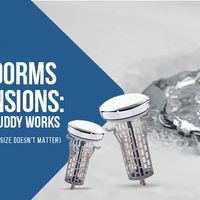Summary:
- Coffee grounds don’t dissolve; they compact into thick masses that block sink drains.
- They stick to grease and debris, creating tough, sticky messes in pipes.
- Grounds can gum up garbage disposals, overload septic tanks, and make drains smell musty.
- Composting or trashing grounds is the safest way to keep pipes clear.
- A sink strainer, like Drain Buddy, catches grounds and food bits before they become a clog.
Yes, coffee grounds can clog your sink drains, and plumbers warn against rinsing them down. This everyday kitchen habit, like washing out a coffee pot after your morning brew, can quietly lead to serious plumbing problems.
Coffee grounds don’t just slip through pipes; they stick, pile up, and create blockages that cause slow drains, bad smells, or even costly repairs. Learning what not to put down your drain and using simple tools can save your pipes, keep your kitchen running smoothly, and prevent expensive plumber visits. With small changes to your routine, you can avoid these headaches and keep your drains clear for years.
Why Do Coffee Grounds Clog Sinks?
They Don’t Dissolve
Unlike some food scraps, like tiny bits of vegetables, that might break down in water, coffee grounds stay solid and gritty. When you rinse them down the sink, they don’t wash away but settle in the pipes, acting like sand that builds up over time.
They Clump Together
When coffee grounds get wet, they stick together, forming a thick, heavy mass that clings to pipe walls. This dense clump traps other bits, like food scraps or soap, making the blockage worse. In a kitchen sink where you clean coffee filters or pots daily, these clumps can form quickly, slowing water flow and creating a stubborn mess that’s hard to clear.
They Bind With Grease & Debris
Coffee grounds mixed with leftover cooking oil, butter, or soap residue in drains, creating a sticky, cement-like sludge. This mix is tough to remove and can completely block water flow.
They Accumulate Over Time
Even a small spoonful of grounds rinsed daily adds up, slowly filling pipes with debris. Over weeks, a fast-draining sink can become sluggish, or stop altogether. This is especially true for families who frequently brew coffee; they might notice their sink draining slower over several weeks, eventually leading to an unexpected clog that disrupts their kitchen routine.
What Are the Consequences of Putting Coffee Grounds Down the Sink?
Clogged Drains
Rinsing coffee grounds down the sink causes slow drainage or full clogs, making water pool in the sink and creating daily frustration. A kitchen sink used to clean coffee makers might start draining slowly after months of grounds, requiring tools or a plumber to fix, which adds to your expenses and stress.
Garbage Disposal Damage
Coffee grounds can stick to the blades and parts inside garbage disposals, gumming them up or dulling them over time. This can cause the disposal to jam or break, leading to costly repairs.
Septic System Strain
For homes with septic tanks, coffee grounds add to the solid waste that collects in the tank, making it fill up faster. This means you’ll need to pump out the tank more often, which can be expensive and inconvenient. If you rinse grounds daily after making coffee, you could face higher septic maintenance costs, especially if other debris is also flushed.
Unpleasant Odors
When coffee grounds mix with grease and moisture in drains, they rot and create bad smells, like musty or sewer-like odors. These smells can rise from the sink, making your kitchen less pleasant to use.
Common Myths Debunked
“Coffee grounds clean pipes.”
Many people think coffee grounds scrub pipes clean, but this is false. Instead of cleaning, they stick to pipes and cause worse clogs, acting like dirt that builds up inside. Grounds rinsed down a sink after brewing coffee will only make your plumbing dirtier, not cleaner.
“A little bit won’t hurt.”
Even a small pinch of grounds rinsed daily can pile up over time, creating slow drains or full clogs. Rinsing out a coffee filter every morning might seem harmless, but after a few months, the buildup can slow your sink, proving that even small amounts cause trouble.
“Garbage disposals can handle them.”
Garbage disposals don’t grind coffee grounds fine enough to wash them away safely. The grounds still settle in pipes, causing buildup and potential damage to the disposal’s parts.
What Are Safe Ways to Dispose of Coffee Grounds?
Instead of rinsing coffee grounds down the sink, compost them to add nitrogen to your compost bin, helping your garden grow healthy plants like roses or tomatoes. If composting isn’t an option, toss the grounds in the trash to keep your pipes safe and clog-free.
You can also dry the grounds and use them as fertilizer to enrich the soil or keep pests like ants away from your backyard. Using a sink strainer catches any stray grounds when rinsing coffee pots, filters, or mugs, stopping them from slipping into the drain.
A sink strainer like Drain Buddy Ultra Flo traps grounds and food bits, and its mold‑resistant, easy‑to‑clean design makes protecting your kitchen (or bath) sink effortless.
Final Verdict
Never rinse coffee grounds down the sink; they’re a major cause of clogs that can harm your pipes and cost you money to fix. However, you can compost or trash them instead to keep your drains clear and your plumbing safe.
For a hassle-free system, you can also use a sink strainer, like Drain Buddy Ultra Flo, which catches stray grounds and debris before they cause problems, making it an easy, mold-resistant upgrade for any kitchen or bathroom.
Start these habits today to protect your pipes and avoid the hassle of slow drains or plumber bills and Visit Drain Strain.







